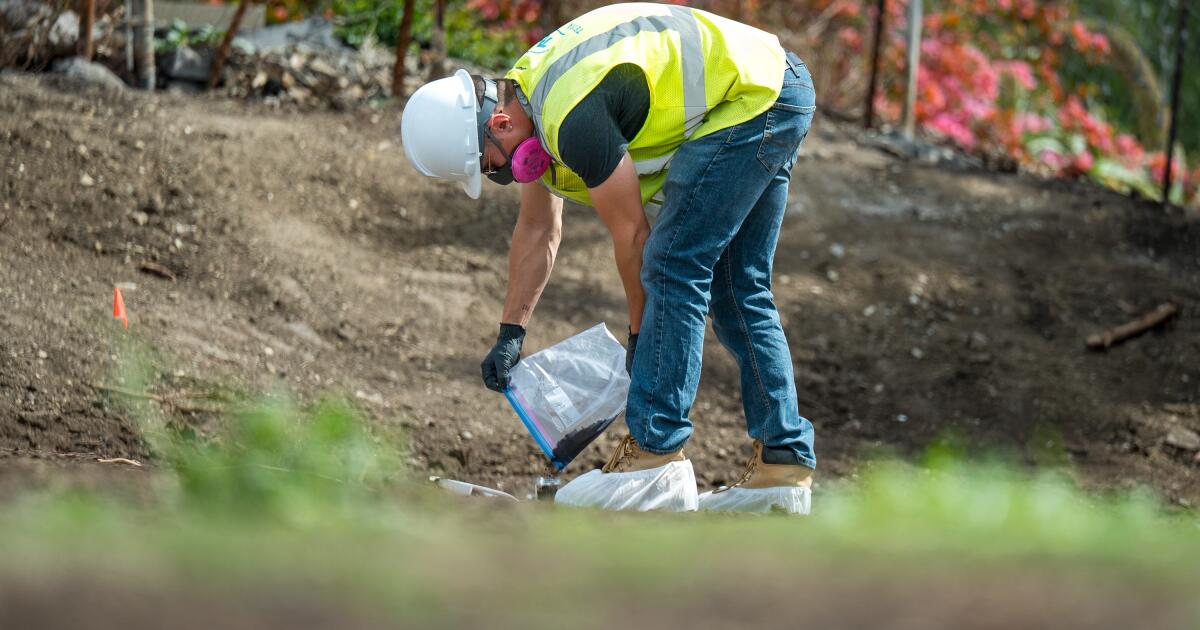Explosive new details have emerged in the case against Bryan Kohberger, with records revealing he placed a series of phone calls to a family member just two hours after allegedly murdering four students in a horror stabbing spree.
The 30-year-old criminology PhD student called his dad Michael Kohberger three times on the morning of November 13, 2022, according to bombshell cell phone records obtained by NBC’s Dateline.
The calls began at 6.17am – just two hours after Kohberger is accused of murdering four University of Idaho students – and each lasted up to 54 minutes.
What exactly the father and son spoke about remains a mystery.
But the shocking revelation comes after prosecutors revealed they plan to call some of Kohberger’s own family members to testify against him at his capital murder trial this summer.
Kohberger is facing the death penalty if convicted of the brutal murders of Kaylee Goncalves, Madison Mogen, Xana Kernodle and Ethan Chapin.
The four University of Idaho students were all slaughtered in a horror knife attack in the early hours of November 13, 2022, inside the off-campus student home at 1122 King Road in Moscow, Idaho, that the three women shared with two other roommates.
The two roommates – Bethany Funke and Dylan Mortensen – survived, with Mortensen coming face-to-face with the masked killer inside the home that haunting night.
A selfie taken by Bryan Kohberger days before his arrest for the murders and obtained by Dateline
Based on the survivors’ accounts as well as surveillance footage which captured a white Hyundai Elantra circling the home, investigators say the murders unfolded just after 4am.
Prosecutors allege the suspect turned his cell phone off or placed it in airplane mode to avoid detection around that time.
At 6.17am – just two hours on from the murders – Kohberger’s cell phone was back on and a call was made from it to his father’s cell phone, according to the records obtained by Dateline.
The call lasted 36 minutes, with cell tower data placing Kohberger’s phone near his apartment in Pullman, Washington, at the time.
This was the first of three calls the suspected killer made to his dad over the next couple of hours, with the longest lasting 54 minutes.
The exact timings of the calls and what the Kohbergers spoke about remains unclear.
It is also unclear if this was typical behavior for Kohberger to call his father at that time.
Kohberger’s parents live in Albrightsville, Pennsylvania, which is three hours ahead of Pullman – making the first call around 9am for Michael.

Exclusive Daily Mail photos show Bryan Kohberger’s father outside the family home in late March


Michael seen in the garden of the Kohberger family home in Albrightsville, Pennsylvania. It has now emerged that Bryan Kohberger allegedly called his dad just two hours after the murders
Following those calls to his father, Kohberger allegedly returned to the scene of the murders, with his phone pinging off a cell tower close to 1122 King Road at 9.12am.
Just one hour after that – at around 10.31am – the quadruple homicide suspect was back at his Pullman apartment, where he snapped a creepy selfie.
In the photo, the suspected killer posed for the camera with his thumbs up and an eerie smile plastered across his face as he stood in front of his shower.
Over another hour passed before the bloodbath was discovered at 1122 King Road and the now-haunting 911 call was placed just before midday.
On December 30, 2022 – around six weeks on from the murders – Washington State University (WSU) student Kohberger was arrested at his parents’ home in Pennsylvania, where he had returned for the holidays.
Kohberger’s father Michael had traveled to Pullman to make the cross-country road trip with his son earlier in the month.
The father and son duo were stopped by police officers twice as they made the days-long journey in the accused killer’s white Hyundai Elantra – the same vehicle prosecutors allege the killer was driving that fateful night.
In the two-plus-years since his arrest, the Kohberger family has kept a low profile and has not spoken out about the allegations against the accused killer.

Young couple Ethan Chapin and Xana Kernodle were found dead on the second floor of the home

Kaylee Goncalves and Madison Mogen were murdered in Mogen’s room on the third floor
The only public comments ever made by the family was a statement released immediately after his arrest where they said they ‘care deeply for the four families who have lost their precious children’, that they were cooperating fully with the investigation and that ‘as a family we will love and support our son and brother.’
Prosecutors previously revealed they plan to call some of Kohberger’s family members – father Michael, mother MaryAnn and two older sisters Amanda and Melissa – as witnesses for the state.
Which family members will testify for the prosecution and why remain a closely-guarded secret.
During a recent court hearing in April – where the defense and prosecution battled it out over the evidence in the case – Kohberger’s lawyers revealed that the family continues to support him and has ‘no interest in helping’ the prosecution in its case.
In a surprisingly sympathetic ruling, Judge Steven Hippler has ruled that Kohberger’s immediate family members can support him inside the courtroom for every day of his high-profile trial – even before they are called to the stand to testify.
New details have also been revealed for the first time about Kohberger’s online activity and behaviors around the time of the murders, including creepy selfies and disturbing porn and serial killer searches.
According to Dateline, Kohberger made several searches around serial killer Ted Bundy – who was put to death for a string of murders including the killings of female students in a sorority house in Florida.
On August 16, 2022 – three months before the murders – Kohberger allegedly Googled ‘ted h7ndy’ and one of his professors, including a paper she had written about Bundy.
In the days after the murders, Kohberger – on multiple occasions – then also allegedly watched shows about the serial killer.
On December 28, 2022 – just three days before his arrest – Kohberger then also allegedly watched a YouTube show named ‘Ted Bundy: Essence of a Psychopath.’
After watching that, Kohberger snapped a series of other selfies.
These haunting images show the man soon to be charged with a brutal quadruple homicide dressed in a black hoody and staring into the camera.
The photo, Dateline reveals, appears to impersonate the hooded image of Bundy on the show he had watched that day.
He also searched and listened to the Britney Spears’ song Criminal.
Other online searches after the murders show the suspect was researching the killings – as well as his own name, the show reported.

The home at 1122 King Road in Moscow, Idaho, on November 20, 2022 – one week on from the murders

Kohberger is accused of returning to the scene hours after the murders – and before the 911 call was placed
He also had a trove of images of female students from WSU and UI, many of them in bikinis.
The images, Dateline reported, appeared to have been taken from social media accounts of students who followed or were friends with either Kernodle, Goncalves or Mogen.
Sources close to the investigation told Dateline that the intended target of the attack is believed to be Mogen.
This belief is based in part on the path the killer allegedly took after entering the three-story home that night.
According to the sources, the killer went straight up to Mogen’s room on the third floor.
But, he unexpectedly found Goncalves sharing Mogen’s bed.
When a noisy struggle broke out, Kernodle – who was downstairs in the kitchen on TikTok – went to investigate and the killer chased her to her room, Dateline reported.
The killer stabbed Kernodle to death and then turned to Chapin who was in her bed, killing him too and then ‘carving’ his legs.
After slaughtering the four victims, the killer chillingly sat down in a chair in Kernodle’s room, Dateline reported.
A bloody impression was found on a chair in the 20-year-old’s bedroom.
The killer then headed toward the back sliding door of the home, passing Mortensen’s bedroom.
It was then that she told police she saw the intruder dressed in a mask and all black, with only his ‘bushy eyebrows’ visible.
Mortensen shut herself in her bedroom, before running down to Funke’s room on the first floor, court records show.
The two survivors called and texted their friends but got no response.
Hours later, they called friends to the home and they made the shocking discovery that the four victims were dead.
It has now emerged that a sixth young woman was also supposed to be in the home that night – but a last-minute decision saved her life.
Ashlin Couch’s mom Angela Navejas told DailyMail.com that Couch was best friends with Mogen and was the sixth roommate still on the lease at 1122 King Road at the time of the murders.

Left to right: Dylan Mortensen, Kaylee Goncalves, Madison Mogen (on Kaylee’s shoulders) Ethan Chapin, Xana Kernodle and Bethany Funke
‘Maddie and Ashlin both got into Pi Beta Phi. And after that, they ended up getting into the [sorority] house together, and they shared a very small room together, and they just bonded,’ Navejas says.
‘It was like an instant friendship, and after that, they were inseparable. They did yoga together, they studied together, they would walk to class together… that was Ashlin’s person, her best friend.’
Couch had moved out of the home in the summer of 2022 after graduating early.
But she would often return to Moscow to spend weekends with her friends and would stay with Mogen when she did.
She had planned to visit that weekend but her mom was on vacation in Florida and Hurricane Nicole had hit the Sunshine State – derailing her journey home.
Navejas asked her daughter to stay at home and look after their dogs, and so the senior canceled her plans to join her friends.
This last-minute cancellation may have saved her life.
Now, more than two years on from the murders, Kohberger’s trial is finally set to begin this August in Ada County.
As well as Mortensen’s eyewitness account, the suspect has been tied to the murders through DNA on a Ka-Bar leather knife sheath left behind by the killer next to Mogen’s lifeless body.

Bryan Kohberger snapped this creepy selfie six hours after the brutal Moscow murders
DNA found on the sheath came back a match to Kohberger. The murder weapon itself has never been found.
Prosecutors say that Kohberger’s Amazon shopping history reveals he bought a Ka-Bar knife, sheath and sharpener from Amazon back in March 2022.
Following the murders, he then allegedly searched for a replacement.
As well as the DNA evidence and eyewitness testimony, prosecutors say Kohberger’s white Hyundai Elantra also matches the car seen leaving the crime scene at the time of the murders.
His cellphone records indicate he may have stalked the King Road home at least a dozen times in the lead-up to the murders, prosecutors say.
Kohberger stood silent at his arraignment in January 2023. A not guilty plea was entered on his behalf.































